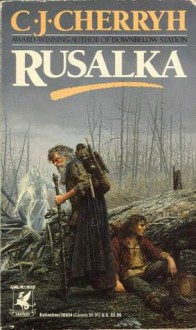



So I finished Rusalka all in one sitting Monday night, partly because I was afraid that if I stopped reading, I wouldn’t start again. Rachel Neumeier commented a few days ago that Rusalka was the only CJC book she really didn’t like, and yeah. Not my favorite of hers by far.
Cherryh usually walks a thin line between a stylistic detachment from her characters and completely disengagement. It’s a weird sort of effect even at its best–the only other author I can remember who uses it is Ursula Le Guin in the Earthsea series–but usually it works pretty well. Partly, I think, because it counterbalances the effect of what otherwise would be a fairly melodramatic plot. Think of Foreignerretold without that slight distance, for example.
But in Rusalka, it goes one step too far, at least for me. One wants Sasha and Pyetr to succeed, but there’s not enough to hold onto. No one’s motives are clear, and everyone comes across as overly passive. I think this may be at least partly because of the way Cherryh switches pov–frustratingly–as soon as a character is about to learn or do something. For instance, Uulamets teaches Sasha things, but we only hear about this secondhand from Pyetr and from Sasha in retrospect.
Uulamets is a complete enigma throughout the book, a figure whose motives are opaque and, it seems, constantly shifting without any insight as to why. Evesha is literally an absent, unobtainable girl, which I might not mind in some circumstances but in this case–coupled with the other characters–it was just too much.
Contrast all of this with Bren Cameron, protagonist of the Foreigner series, who is often confused, mislead, and without direct agency, but who nonetheless acts, or at least tries to act. All of Cherryh’s books that I’ve read are quite like the middle of Lois McMaster Bujold’s Memory (as Jo Walton memorably said), going on forever. But usually the reader is invested enough in the characters for some almost indefinable reason that it doesn’t matter.
I don’t know–Cherryh does a nice job with the Russian-inspired setting, at least to my somewhat limited knowledge. I especially like the sense of vastness, which shows up in a lot of 19th century Russian art–the land going on forever. And she weaves in a lot of Russian mythology (no firebirds though, alas) in a way that I found convincing and organic. I’m not sure yet whether I’ll finish the trilogy–on the one hand, I like the 2nd and 3rd Foreigner books better than the first, and Rusalka did in some ways read as one long set-up. On the other, do I want to be continually frustrated and annoyed by the characters? I don’t know. I’ll probably try the second, but also not feel bad if I DNF it. Life is too short, and Cherryh is too prolific.